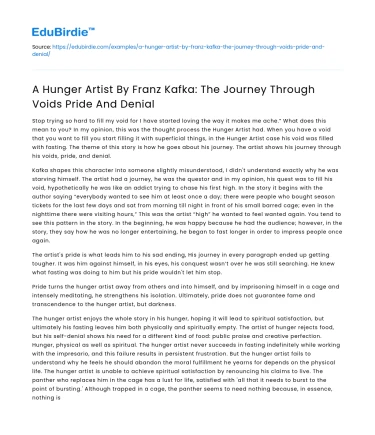Stop trying so hard to fill my void for I have started loving the way it makes me ache.” What does this mean to you? In my opinion, this was the thought process the Hunger Artist had. When you have a void that you want to fill you start filling it with superficial things, in the Hunger Artist case his void was filled with fasting. The theme of this story is how he goes about his journey. The artist shows his journey through his voids, pride, and denial.
Kafka shapes this character into someone slightly misunderstood, I didn't understand exactly why he was starving himself. The artist had a journey, he was the questor and in my opinion, his quest was to fill his void, hypothetically he was like an addict trying to chase his first high. In the story it begins with the author saying “everybody wanted to see him at least once a day; there were people who bought season tickets for the last few days and sat from morning till night in front of his small barred cage; even in the nighttime there were visiting hours,” This was the artist “high” he wanted to feel wanted again. You tend to see this pattern in the story. In the beginning, he was happy because he had the audience; however, in the story, they say how he was no longer entertaining, he began to fast longer in order to impress people once again.
Save your time!
We can take care of your essay
- Proper editing and formatting
- Free revision, title page, and bibliography
- Flexible prices and money-back guarantee
The artist's pride is what leads him to his sad ending, His journey in every paragraph ended up getting tougher. It was him against himself, in his eyes, his conquest wasn’t over he was still searching. He knew what fasting was doing to him but his pride wouldn't let him stop.
Pride turns the hunger artist away from others and into himself, and by imprisoning himself in a cage and intensely meditating, he strengthens his isolation. Ultimately, pride does not guarantee fame and transcendence to the hunger artist, but darkness.
The hunger artist enjoys the whole story in his hunger, hoping it will lead to spiritual satisfaction, but ultimately his fasting leaves him both physically and spiritually empty. The artist of hunger rejects food, but his self-denial shows his need for a different kind of food: public praise and creative perfection. Hunger, physical as well as spiritual. The hunger artist never succeeds in fasting indefinitely while working with the impresario, and this failure results in persistent frustration. But the hunger artist fails to understand why he feels he should abandon the moral fulfillment he yearns for depends on the physical life. The hunger artist is unable to achieve spiritual satisfaction by renouncing his claims to live. The panther who replaces him in the cage has a lust for life, satisfied with 'all that it needs to burst to the point of bursting.' Although trapped in a cage, the panther seems to need nothing because, in essence, nothing is missing. The hunger artist dies empty and alone.






 Stuck on your essay?
Stuck on your essay?

